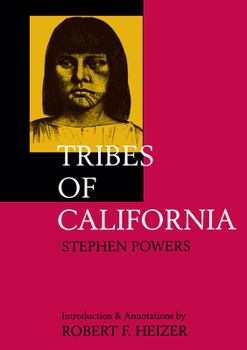Tribes of California
Select Format
Select Condition 
Book Overview
This classic of American Indian ethnography, originally published in 1877, is again available in its complete form. In the summers of 1871 and 1872 Powers visited Indian groups in the northern two-thirds of California. A journalist by profession, he was untrained in ethnography, but was nonetheless an astonishingly intelligent observer who had a gift for writing in a spirited manner. He reported faithfully what he heard and portrayed accurately what...
Format:Paperback
Language:English
ISBN:0520031725
ISBN13:9780520031722
Release Date:November 1976
Publisher:University of California Press
Length:512 Pages
Weight:1.50 lbs.
Dimensions:1.3" x 5.9" x 9.2"
Customer Reviews
3 ratings
Ignores Southern California
Published by Thriftbooks.com User , 16 years ago
A great book. However, it is worth noting that the author made no attempt to describe the tribes south of the Tehachapi Pass. Here is a quote from the editor's inroduction: "Powers did not make investigations south of the Tehachapi Pass since he believed the cultures of these tribes had become too much altered in the missions to be worth studying." The book includes countless interesting observations of tribes north of the aforementioned point, but the total exclusion of tribes south of said point leave this reader wanting.
1870's Encycolpedic Detail of 25 California Tribes
Published by Thriftbooks.com User , 19 years ago
First, this book is difficult to read because the encyclopedic style of the text is so dry. The author offers many details and did most of his research first hand in the early 1870s. Powers was primarily concerned with writing about authentic native american traditions and not habits adapted from the europeans such as the Spanish who came before him. If some of Powers' information is from other sources, he cites them by name. This book covers 25 small tribes including the Karok, Yurok, Tolowa, Hupa, Patawat, Pomo, Yokaia, Gallinomero, Wintun, Modok and Yosemite. With each tribe the author writes geographic details, language details such as numbers, food preparation and dancing or celebration details. It is truly amazing how different these tribes were in terms of their customs and behavior. While all were living in relatively primitive conditions, the social behavior was distinct between the various tribes. Be warned that there is a racial overtone to the book such as when the author writes "Once more I must assert, at whatever risk, that there were occasional passages in these barbaric chants which were very beautiful indeed." (chapter XXII The Kabinapek) Overall, Tribes of California is a very informative ethnological study of many tribes that had surprising differences in culture.
First-hand, first-rate information on California Tribes
Published by Thriftbooks.com User , 20 years ago
Mr. Powers had a unique way of learning about the Native Americans of California. Instead of talking to translators, early European settlers, or reading articles, he talked to people in the various Indian tribes in California. This was in the latter part of the 19th century.Mr. Powers has been criticized in his time as an "amateur," but his research is first-rate and he has done original research from the source, rather than repeat inaccurate "facts."






